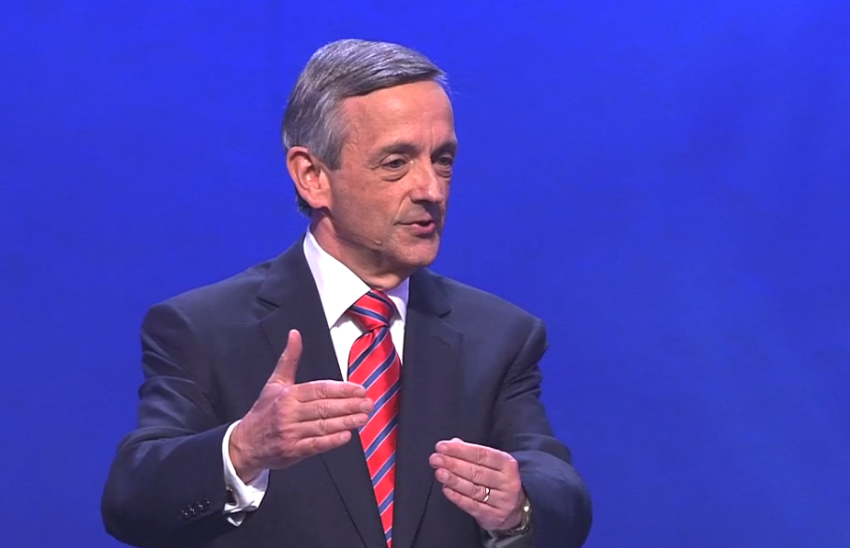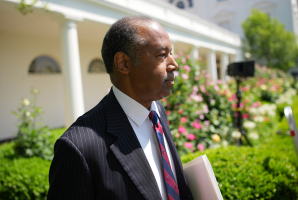Robert Jeffress rejects ‘Christian nationalist’ label, says America founded as ‘Christian nation’

Megachurch Pastor Robert Jeffress told his congregation Sunday that he is not a "Christian nationalist" but insisted that the United States was founded as a "Christian nation."
The senior pastor of First Baptist Dallas suggested that a perversion of the U.S. Constitution by progressives, atheists and others over the years has led to the creation of a secular nation now defined by a culture that is both tragic and decadent.
"When you see these mass shootings in Uvalde, when you see these mass shootings in Buffalo and other places, what's going on here? That's just the tip of the iceberg," Jeffress, who leads the 12,000-member Texas congregation, told churchgoers in a sermon lamenting the secularization of society.
"Today, over 10 million teenagers in the U.S. drink alcohol regularly; 20 percent engage in binge drinking; 2,800 children die each year as a result of gun violence; another 14,300 are injured. Nearly 1 million babies were murdered in the womb last year, and one in four women in the U.S. will have aborted at least one of their children by age 45. On and on and on it goes. Are these tragedies just a coincidence?" he asked.
"Now, just consider the warning that God gave to His own people Israel. In Hosea 46, He said, 'My people are destroyed for lack of knowledge. Because you have rejected knowledge, I will also reject you from being My priest.' Listen to this: 'Since you have forgotten the law of your God, I will also forget your children,'" Jeffress said.
At the start of his message, Jeffress said that anyone listening to "left-wing" organizations like the American Civil Liberties Union or the Freedom From Religion Foundation "will come to believe that America was founded by men with a wide diversity of religious beliefs."
"Their goal was to build an unscalable wall around this country that would protect this country from any religious influence seeping into public life. That version of American history belongs in the same category as the story of George Washington and the cherry tree. It is a complete myth," he stressed.
The pastor compiled arguments for America's Christian founding to demonstrate how the country has detoured from the original intent of the Founding Fathers and the consequences.
"I often get accused of being a Christian nationalist," Jeffress told his congregants. "I'm having reporters ask me all the time: 'This is a new phrase, Christian nationalism, are you a Christian nationalist? Do you believe America is exceptional to any other nation and is God's preferred nation?' And I answer with a resounding, 'No, not in any sense.' If you know anything about the God of the Bible, you know God is no respecter of people or nations."
Jeffress said that America has been "uniquely blessed" by God, but warned that if God's will is rejected, the nation will suffer the consequences.
"He's given us so much. You can see His hand in the founding of our country. But in the final analysis, God is no respecter of people or nations. Any nation that reverences God will be blessed by God, and any nation, including the United States, that rejects God will be rejected by God," he said.
For years, particularly since the election of former President Donald Trump in 2016, left-leaning media outlets and progressive Christians have raised concerns about what they claim to be Christian nationalist beliefs.
Joseph Williams, assistant professor of American religious history at Rutgers University, said: "Christian nationalists insist that the United States was established as an explicitly Christian nation, and they believe that this close relationship between Christianity and the state needs to be protected — and in many respects restored — in order for the U.S. to fulfill its God-given destiny."
In 2019, a campaign launched by the Baptist Joint Committee, a progressive faith-based group of attorneys, Capitol Hill insiders, ministers and scholars, criticized what they deemed as "Christian nationalist" ideology.
"Christian nationalism seeks to merge Christian and American identities, distorting both the Christian faith and America's constitutional democracy," the group Christians Against Christian Nationalism said in a statement.
"Christian nationalism demands Christianity be privileged by the State and implies that to be a good American, one must be Christian. It often overlaps with and provides cover for white supremacy and racial subjugation. We reject this damaging political ideology and invite our Christian brothers and sisters to join us in opposing this threat to our faith and to our nation."
Some liberals, including an op-ed in The New York Times, have suggested that the shifting of the Supreme Court to a conservative majority that recently overturned the 1973 Roe v. Wade ruling is a result of the work of the Christian nationalist movement.
"The shape of the Christian nationalist movement in the post-Roe future is coming into view, and it should terrify anyone concerned for the future of constitutional democracy," wrote Katherine Stewart, author of The Power Worshippers: Inside the Dangerous Rise of Religious Nationalism.
"The Supreme Court's decision to rescind the reproductive rights that American women have enjoyed over the past half-century will not lead America's homegrown religious authoritarians to retire from the culture wars and enjoy a sweet moment of triumph. On the contrary, movement leaders are already preparing for a new and more brutal phase of their assault on individual rights and democratic self-governance," she wrote. "Breaking American democracy isn't an unintended side effect of Christian nationalism. It is the point of the project."
In his sermon on Sunday, Jeffress made no apologies for his belief that America's future success rests on the nation's fidelity to Christian values.
"America was founded predominantly … by Christians who wanted to build this Christian nation on the foundation of God's will," he said. "And furthermore, these men believed that the future success of our country depended upon our fidelity to the Christian beliefs. And that's why we can say, though it's politically incorrect to do so, we say without hesitation or apology that America was founded as a Christian nation, and our future success depends upon our country being faithful to those eternal truths of God's Word."
Jeffress also echoed similar sentiments recently shared by born-again Rep. Lauren Boebert, R-Colo., that the founding fathers did not intend for the Church to be separate from the state in the way secularists want it to be applied today.
The Establishment Clause of the First Amendment to the U.S. Constitution "prohibits the government from making any law respecting an establishment of religion" and "government actions that unduly favor one religion over another." It also prohibits the government from "unduly preferring religion over non-religion, or non-religion over religion."
Jeffress pointed to the 1802 letter from President Thomas Jefferson to the Danbury Baptist Church Association in Connecticut stating that the First Amendment has "a wall of separation between Church and State." He said that letter was only to prevent the government from favoring one Christian denomination over another. It was not intended to make all religions equal.
"Did you know 69% of the American people believe that the phrase 'separation of Church and state' is found in the Constitution? They are surprised when they learn that the phrase 'separation of Church and state' is nowhere in the First Amendment. It doesn't appear anywhere in the Constitution itself. So how did such an idea gain popularity in America?" Jeffress asked.
He said when Jefferson wrote to the Baptists in Danbury, they were upset that the Congregational Church was getting more tax funding as an "established" church by the state of Connecticut.
"So Thomas Jefferson on Jan. 1, 1802, wrote them a letter to calm them down. And like any good politician, he quoted from one of their own, a Baptist, the first prominent Baptist, Roger Williams, who first used that phrase 'separation of Church and state,'" he said.
"What you have to understand is whether it was the First Amendment saying 'there shall be no established Church,' or Jefferson's letter. When they talked about no established Church, they meant no Christian denomination should be elevated over another Christian denomination; they should all be on equal footing. That's what they were talking about," Jeffress contends.
"Never in his wildest imagination did Thomas Jefferson ever suspect that one day his letter would be used to prohibit prayer in the public schools or Bible reading or the nativity displays in the town square, using the name of Jesus in a commencement speech. That was never in his mind at all."



























